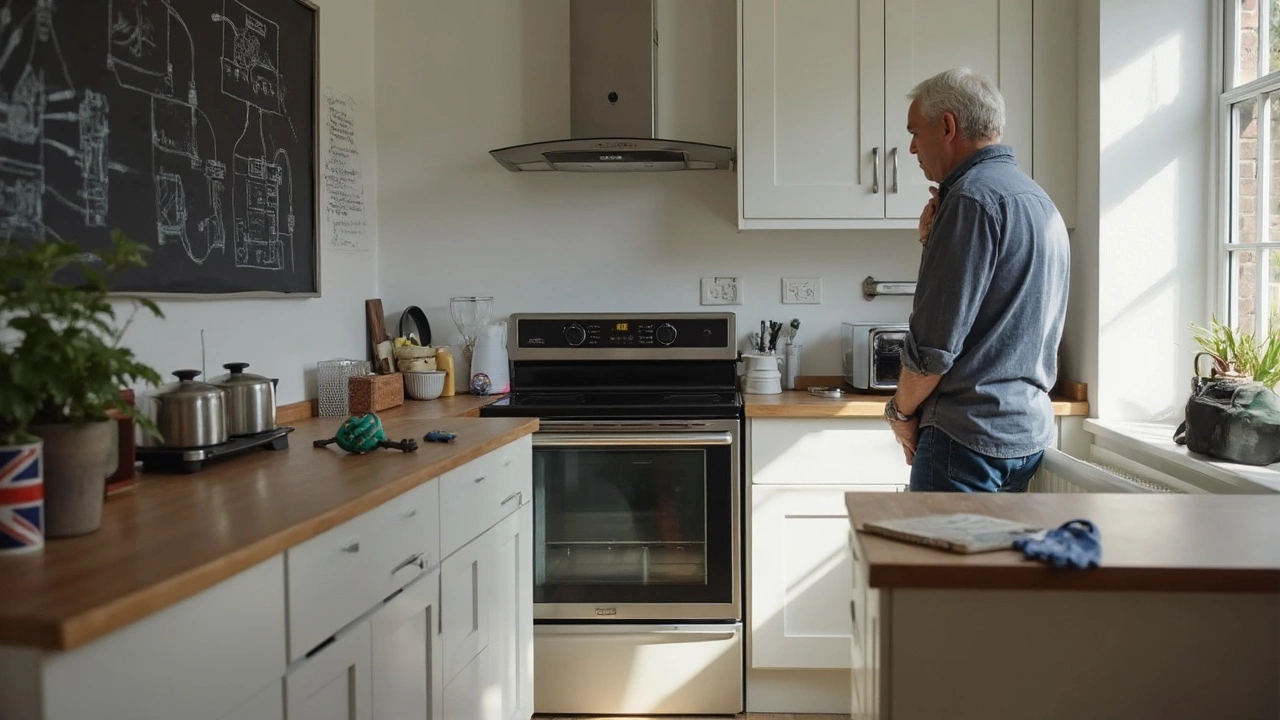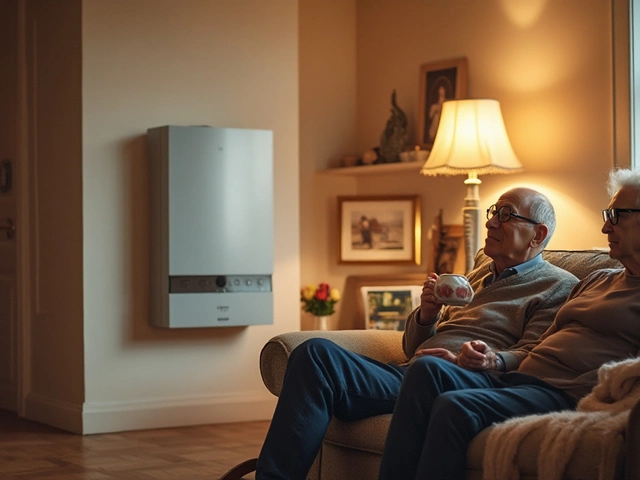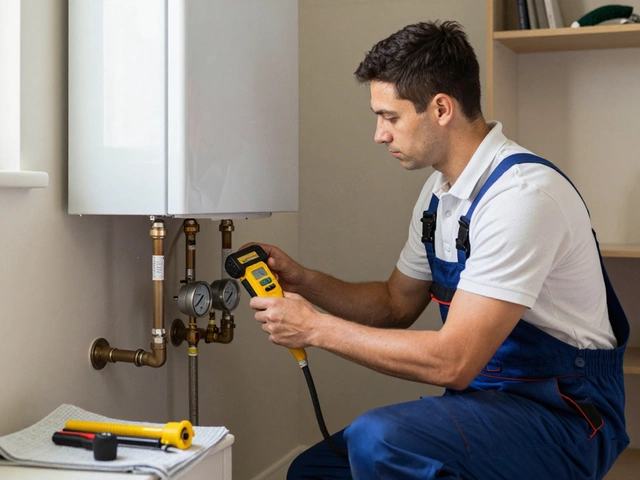Thinking about swapping out your electric oven? Don’t grab that screwdriver just yet. Even though it might look as easy as sliding the old one out and the new one in, ovens have a way of pretending to be simple—until you hit a wall. Modern electric ovens suck up way more power than most kitchen gadgets, and that means the wiring behind the scenes needs to be up to the job. Some ovens don’t even come with a regular plug—just thick cables meant to hook directly into your home’s electrical box.
If you mess up the wiring, you're not just risking a blown fuse. In rare cases, you might start a fire or fry the new oven before you even get to bake your first pizza. Insurance companies love to point out that a dodgy DIY installation can also void your warranty and leave you in hot water if something goes wrong. So, before you haul that shiny new oven into place, let’s break down what’s safe to tackle on your own and what really calls for a pro with a tool belt and a license.
- Why Oven Replacement Isn’t Always Plug-and-Play
- Risks and What Could Go Wrong
- How to Tell When You Need an Electrician
- Pro Tips for a Smooth Oven Swap
Why Oven Replacement Isn’t Always Plug-and-Play
Swapping a electric oven isn’t like updating your microwave or coffee maker. Most electric ovens draw way more power—usually 240 volts—compared to the 120 volts used by regular kitchen stuff. That means you can’t just use any old outlet. For built-in ovens especially, you’re usually dealing with hardwiring instead of a basic plug. If the new oven doesn’t match what’s already hooked up, you’ve got more work to do than just moving boxes around.
There’s also the question of amperage. Ovens can need anywhere between 15 to 50 amps depending on their size and features. If your current wiring is too weak for your new oven, not only will it trip breakers, but it can also heat up and start melting insulation. That’s why manufacturers and home safety codes often say you must have a dedicated circuit just for your electric oven—no sharing with your dishwasher or fridge.
- Check the oven’s specs for voltage and amps before you buy. Match them to what’s running to your old oven spot.
- If the oven came with a cable, compare the prong shape to your wall outlet—some new ovens skip plugs altogether, expecting direct wiring.
- Wall cutout sizes can be sneaky. Even if two ovens look alike, the dimensions for fitting into your cabinet can change over the years.
According to a recent survey by the National Fire Protection Association, over 1,000 home fires a year are caused by electrical failures or malfunctions with cooking equipment. Just because the oven turns on doesn’t mean the connections are safe—or that your insurance would pay for damage if something went wrong. Factory warranties for a electric oven also usually require professional installation, and skipping this step can mean a major headache if you ever need a repair or replacement down the line.
Risks and What Could Go Wrong
There’s a lot that can go sideways if you try swapping in a electric oven without knowing what you’re doing. First off, these ovens pull heavy power, often 240 volts, compared to the 120 volts most outlets use. Messing with high-voltage wiring is no joke—one wrong move and you could get shocked hard enough to put you in the hospital.
One of the biggest risks is mismatching the wiring. If your home’s kitchen circuit isn’t built for the new oven’s power needs, you could overload the breaker, which sometimes leads to melted wires inside your walls. That’s a fire hazard—no exaggeration. Fire departments report that faulty appliance wiring is a top cause of household fires each year.
- Warranty voided: Many oven brands state in their warranty papers that professional installation is required. If you DIY and something burns out, you may be out of pocket for the repair.
- Insurance problems: If your home insurance finds out an accident is tied to a self-install, a claim can get rejected. Insurers want proof that a licensed electrician did the job.
- Hidden damage: Sometimes, damage from a bad install (like burnt wires) doesn’t show up right away. It can take months to notice a problem, like a circuit breaker tripping over and over, or you smelling something burning behind the oven. Fixing these hidden issues later is always more expensive than just hiring a pro upfront.
Some apartment buildings and local regulations also require permits or proof of a certified electrician for any major oven replacement. Violating these rules can mean fines or being forced to redo the work properly. It sounds fussy, but it’s about keeping everyone safe.
| What Can Go Wrong | Possible Outcome |
|---|---|
| Wrong wire size | Wire overheating, electrical fire risk |
| Poor grounding | Shock hazard, oven damage |
| Loose connections | Intermittent power, oven won’t heat properly |
| Unrated outlet | Breaker trips, oven won’t run |
If any of this sounds stressful, you’re not alone. Oven wiring is a top reason people call electricians—and for good reason. Taking shortcuts just isn’t worth the risk when you’re dealing with this much power. Better to play it safe before you end up with more than a broken electric oven on your hands.

How to Tell When You Need an Electrician
So, should you call a pro, or can you swap out your electric oven yourself? Here’s where things get real. Not all oven setups are created equal, and some are downright tricky. Let’s break down when you definitely want a licensed electrician handling the job.
- Your current oven is hardwired. Open up the bottom panel or pull out the oven a bit—if you see a thick cable running straight into the wall (no plug), stop. Hardwired ovens aren’t DIY-friendly. They need to be disconnected and installed at your home’s main electrical panel.
- The voltage doesn’t match. Most electric ovens in the U.S. want 240 volts. If your old unit ran on 120 volts or the outlet looks different, you’ll need new wiring. That’s electrician territory—no shortcuts here.
- The wires look old or damaged. Frayed cables, cracking insulation, weird colors—these are warning signs. Swapping out ovens with bad wiring isn’t just risky; it could be a fire hazard.
- You want to upgrade or move your oven location. Shifting to a new spot or changing from gas to electric? You need a pro to run new circuits safely and up to code.
- No dedicated circuit. Electric ovens pull a ton of juice. If your oven shares an outlet with the toaster, microwave, or coffee maker—don’t even try. A dedicated 30- or 40-amp circuit is standard. If you’re not sure what you have, better let a electric oven pro check it.
The National Fire Protection Association reported that faulty wiring is the #1 reason for house fires caused by home appliances. That’s not something to take lightly. Here’s what to keep an eye on if you want to stay safe and keep your oven’s warranty valid.
| Situation | DIY Okay? | Electrician Needed? |
|---|---|---|
| Plug-in oven matches outlet voltage | Yes | No |
| Hardwired oven | No | Yes |
| Outlet or wiring looks damaged | No | Yes |
| Changing oven type (gas to electric) | No | Yes |
| No dedicated circuit | No | Yes |
If you run into any of these red flags, make the call—don’t take chances with your kitchen. Replacing an electric oven sounds like a weekend project until you start dealing with circuit breakers and heavy-gauge wires. When in doubt, trust a pro, not a how-to video.
Pro Tips for a Smooth Oven Swap
Planning ahead makes replacing an electric oven so much less stressful, and you'll avoid headaches that come from last-minute surprises. Here’s what you want to check before you even order that new oven.
- Measure twice, buy once: Double-check both the old oven and the opening in your cabinets. Measure width, height, and depth—oven sizes can differ by more than you’d think. You don’t want to drag home a new oven and realize it won’t fit.
- Check your power supply: Most built-in ovens use a dedicated 240-volt circuit. Look at the wiring behind your old oven. See a thick cable heading into the wall and maybe even a breaker labeled “Oven”? That’s a sign you shouldn’t just plug in the new one without checking compatibility.
- Shut off the power before touching anything: Cutting power at the main switch isn’t just a good idea—it’s survival. Electricity from a 240-volt circuit can actually kill you. Use a voltage tester to make sure there’s no current.
- Snap a photo of the connections: If you’re confident doing basic electrical work, take a picture of the wiring before you disconnect the old oven. This helps you or an electrician hook up the new one correctly, especially if the wire colors don’t match up.
- Read the manual—closely: Manufacturers sometimes require specific fuses, cable gauges, or installation steps that are easy to overlook. Ignoring them can void your warranty or damage your oven.
- When in doubt, call a pro: If anything feels off—like brittle wires, mismatched colors, or even tiny sparks—get a licensed electrician. A bad hookup can seriously damage your home and leave you footing the bill for more than just a new oven.
Here’s a quick look at some common mistakes to avoid when replacing a electric oven:
| Mistake | What Can Happen |
|---|---|
| Wrong voltage or circuit | Oven won’t work, or you’ll trip the breaker right away |
| Loose connections | Risk of fire or oven damage |
| Forgetting to secure the oven | Oven could tip or move while in use |
| No ground wire | Serious shock hazard |
Swapping out an electric oven isn’t rocket science, but it does need some respect for the power involved. Spend a few extra minutes checking everything up front and you’ll save money, time, and maybe even your kitchen. If you’re even a little unsure, that’s your cue to call in a pro—it’s usually cheaper than fixing a big mistake later.





